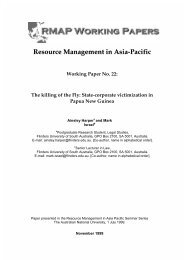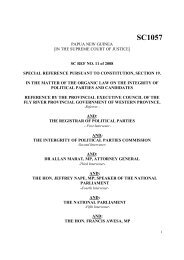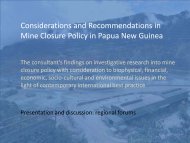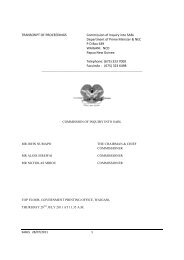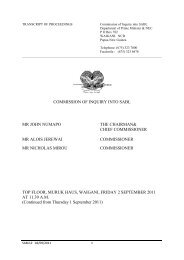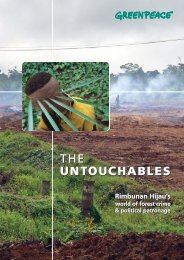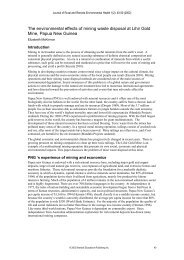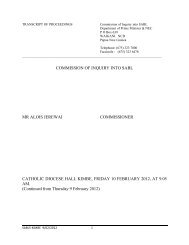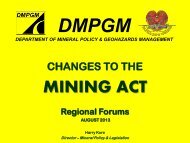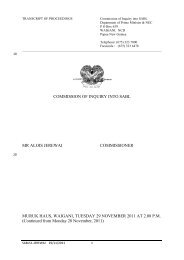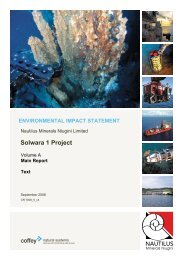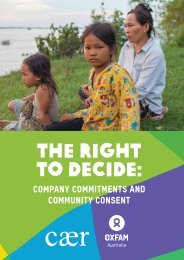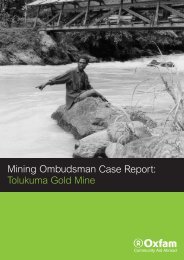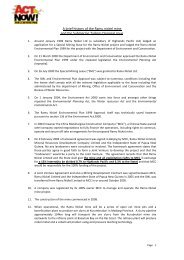Fishy business. The Social Impact of SST.pdf - Act Now!
Fishy business. The Social Impact of SST.pdf - Act Now!
Fishy business. The Social Impact of SST.pdf - Act Now!
Create successful ePaper yourself
Turn your PDF publications into a flip-book with our unique Google optimized e-Paper software.
<strong>The</strong> WWF consultant also notes that <strong>SST</strong>’s E nvironmental Plan and Management Planpromises that “South Seas Tuna Corporation will carry out a baseline economic survey <strong>of</strong> itsemployees at the time <strong>of</strong> their recruitment. This survey will help with long term monitoring(Section 9.3.4 p.9.9)”and that“<strong>The</strong> South Seas Tuna Corporation will work wtih the Wewak Town Council, the East SepikProvincial Government and the relevant Utility Managers in a co-operative manner to help themimprove the infrastructure <strong>of</strong> Wewak.(Section 9.3.4 p.9.9).”•WWF’s Wewak <strong>of</strong>fice then volunteered to assist local level and provincial government toestablish mechanisms for both <strong>of</strong> these things to happen, reaching out to form a kind <strong>of</strong> CSRpartnership unique to PNG (see the WWF report excerpts above). Among their concerns at thetime, which remain concerns for the public today, were whether or not the size <strong>of</strong> the municipaldump and the town water supply could support the new factory; whether or not privatizing theseservices would be beneficial; and how an independent monitoring authority for environmentaland social impact reporting might operate. “It is important,” says the WWF report, “thatindependent outside individuals and agencies conduct a full social impact assessment and peerreview the proposed monitoring programme, in addition to the OEC peer review the proposedmonitoring programme. It is also important that the OEC and DES provide to the reviewers thecontext within which the proposal and monitoring will take place.”•We reiterate the specific WWF concerns regarding:• wages (as being sufficient to justify the workforce’s absence from a subsistence economy—i.e. as being living wages);•the possible effects <strong>of</strong> in-migration (which is something already being felt in Madang with RDTuna) and the creation <strong>of</strong> a pool <strong>of</strong> unemployed workers; the impact <strong>of</strong> this factory environmenton the sexual health <strong>of</strong> employees;•the equable distribution <strong>of</strong> town water supply (given that the <strong>SST</strong> EP included a proposed‘plugging <strong>of</strong> water lost to ground at Moem Barracks’---has this been effected, and is the savingenough to <strong>of</strong>fset the factory demand?);•the need for more refuse disposal services;•the need for permanent and reliable technical expertise to monitor environmental standards forthe waste treatment (including culture control in the oxidation pool), odour control (organicsludge exposure to air) and <strong>of</strong>fshore waste dumping <strong>of</strong> the facory;•the risk <strong>of</strong> sharks at the dumping zone;•the risk <strong>of</strong> overfishing, not just in light <strong>of</strong> <strong>SST</strong>, but in light <strong>of</strong> its expansion and theproliferation <strong>of</strong> fish processing plants in the province; this refers mainly to the effect <strong>of</strong>deepwater fishing on inshore fish stock required by local fishing operators, but also the MSYand its overall ecological impact, including bycatch yields;171



